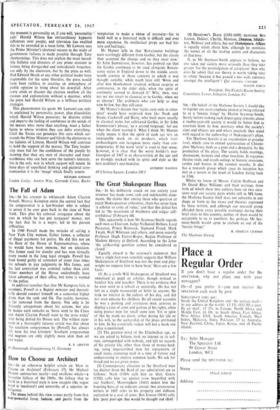The Great Shakespeare Hoax
SIR,—In his deliberate attack on our society your reviewer has made some rash and indefensible state- ments. He claims that among those who question or reject Shakespearean orthodoxy, there has never been 'a scholar or critic of value,' and that this defect has led to `the maximum of brashness and vulgar self- confidence' (February 10).
This apparently is how Mr Seymour-Smith regards such men as Emerson, Judge Nathaniel Holmes, Lord Penzance, Prince Bismarck, Sigmund Freud, Mark Twain, Walt Whitman and others, and more recently Professor Hugh Trevor-Roper, Regius Professor of Modern History at Oxford. According to the latter 'the authorship question cannot be considered as closed.'
Equally absurd is the reviewer's statement that `not a single fact even remotely suggests that William Shakespeare of Stratford was not the poet and play- wright we suppose him to have been.' Here are a few facts: (1) As a youth Will Shakespeare of Stratford was unnoticed as pupil or scholar, though noticed as butcher boy and poacher. There is no evidence that he ever went to a school or university. He has not left us a single manuscript or letter to anyone. He took no interest in the culture of his day, and did no' even educate his children. By all extant accounts he was a pushing and avaricious man, anxious to display a coat of arms and jealous of his rights, often suing poorer men for small sums lent. Yet in spite of this he made no claim, either during his life or in his will, to the authorship of the plays attributed to him. In his essentially vulgar will not a book nor a play is mentioned.
(2) The greatest mind of the Elizabethan age, so we are asked to believe, took no interest in its cul- ture, corresponded with nobody, and left no records of his private life, other than those of money-lend- ing, suing impoverished men for repayments of small loans, cornering malt in a time of famine and endeavouring to enclose common lands. We ask for bread and we are given stones.
(3) Contemporary allusions to the Stratford man (as distinct from the Bard of our admiration) are as follows: Nash (1589) calls him an idiot; Green (1592) calls him 'an upstart crow beautified with our feathers'; Manningham (1601) makes him the boasting hero of an indecent amour; two anonymous writers in 1605 refer to his property and dubious aspiration to a coat of arms; Ben Jonson (1616) calls him 'poor poet-ape that would be thought our chief.'
(4) Henslowe's Diary (1591-1609) mentions Ben Jonson, Dekker, Chettle, Marston, Drayton, Middle- ton, Webster and others, but not Shakespeare. Alleys is equally silent about him, although he mentions the names of all the leading actors and dramatists of thattime.
If, as Mr Seymour-Smith appears to believe, no one takes our society more seriously than they take groups 'for the promulgation of ectoplasm' then why does he admit that our theory is worth taking time to refute 'because it has gained a too wide currency amongst the intelligent"? Qui s'excuse s'accuse.






























 Previous page
Previous page